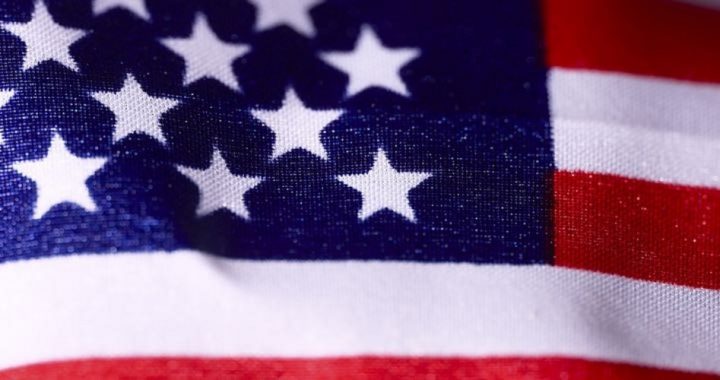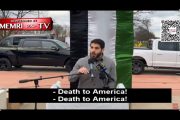
Students at California High School in San Ramon, 35 miles east of San Francisco, have taken upon themselves to ban America’s National Anthem from high-school assemblies, saying that the song’s obscure and seldom (read: never) sung third verse is racist.
Led by student body president Ariyana Kermanizadeh, the school’s student council decided to drop the National Anthem from a January 19 student assembly, replacing the traditionally sober moments the song takes up with fun and games.
In the high school’s student newspaper, Kermanizadeh explained in an open letter that a few weeks before the rally, “It was brought to our attention that the National Anthem’s third verse is outdated and racially insensitive.”
The verse in question includes the phrases —
“No refuge could save the hireling and slave,
“From the terror of flight or the gloom of the grave,
“And the star-spangled banner in triumph doth wave
“O’er the land of the free and home of the brave.”
Kermanizadeh explained that after studying the verse, she and the other student council officers “thought that this was completely unacceptable and must be removed from the rally.”
President Kermanizadeh added that she and the rest of the student council elite “understand that this third verse is not included when the anthem is performed, but still, what does this tell us? This verse translated, finds joy in the killing of African-Americans. To think that our nation’s anthem once had the word slave and ‘land of the free’ in the same sentence leaves me speechless. Moving forward, we must take action and be inclusive to all” — an indication that, for this year at least, the National Anthem will be forbidden at future California High School functions.
Of course, if one were to read the contested verse in the manner that Kermanizadeh and the council did — that the song “finds joy in the killing of African-Americans” — one would also have to believe that the disputed verse “finds joy in the killing” of “hirelings,” as they are noted in the same phrase. Though the meaning of the verse is obscure, and one would need to resurrect Francis Scott Key, the author, from the dead to determine its exact meaning, it seems clear that Key was simply happy that it was the British and their allies who were the ones who were fleeing or being killed, rather than the upstart Colonial forces. One could also safely conclude that either Kermanizadeh and the council would have rather had the British win — though the British were in favor of slavery and essentially mandated its continuance in some colonies — or the students were simply mindlessly following the politically correct path that public schools encourage their students follow.
Kermanizadeh’s statement seems to indicate the latter.
Noting that the National Anthem was composed more than 200 years ago, Kermanizadeh asked her fellow students to “imagine all the traditions and laws that have changed” since that archaic era, which was filled with ignorance and intolerance. She went on to list a few of the advances, including the Constitution’s 15th Amendment that “granted African Americans the right to vote in 1870,” along with the Voting Rights Act of 1965 that “fully allowed African Americans to vote, and outlawed legal barriers that prevented African Americans from voting.” Add to that the 19th Amendment, which “allowed women the right to vote in 1920,” along with, of course, the election of Barack Obama, who “became the first African American President on Nov. 5, 2008. As our culture shifts to one that is more diverse and accepting of all types of people, so must our traditions.”
To the students who questioned or disagreed with the student council’s unilateral decision to ban the respected and beloved Anthem, Kermanizadeh insisted, “I hear you, but we plan to keep our stance” and disallow the anthem from future assemblies during the year.
Among the students to raise their voices against the student council move was California High School senior Amir Udler, who took to Facebook to call for the National Anthem to be returned to school assemblies. Referring to the offending verse under scrutiny, Udler wrote that “we must recognize and learn from the awful stain on the history of our country that is slavery. But we can not allow under any circumstances for every patriotic icon that we have to be taken apart and disposed of merely because of any associations it might have.”
Another senior at the school, Dennis Fiorentinos, told the San Francisco Chronicle that while he respected the opinions of those who made the decision to drop the anthem, they seem to be missing an important point: “The unifying message that the national anthem gives off is important and it’s important to respect our veterans who died and served protecting our freedoms — like the freedom to choose not play the anthem. It’s those freedoms that we owe much to men and women who died protecting them.”
The response of Fox New commentator Todd Starnes to the news story mirrored those of many other Americans: “Okay — enough of this nonsense. Where are the grown-ups in charge of this mess?”
As it happens, adult officials within the San Ramon school district were taking a hands-off approach to the situation, allowing the students to chart their own course. District spokeswoman Elizabeth Graswich issued a statement saying that the student council members “made their decision after learning that the third verse is seen as offensive to some groups.” She added that the students “understand that there are objections to their decision and will be using this opportunity to have further dialogue about future rallies.”



